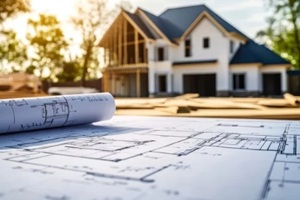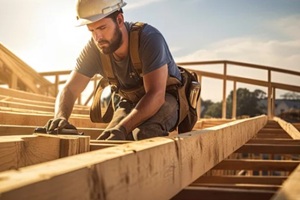
Operating an independent contracting business in the home building industry requires more than excellent craftsmanship and reliable scheduling. While you are focused on delivering quality construction projects, unforeseen accidents, property damage, or legal claims can threaten your business’s financial stability.
Home builders insurance provides the protection needed to keep your operation running smoothly when unexpected challenges arise. This guide explains what home builders insurance covers, why it matters, and how to protect your contracting business effectively.
The Reality of Risk in Home Construction
Building homes is among the most dangerous industries in the United States. According to OSHA, construction workers regularly encounter serious hazards, including falls from rooftops, unguarded machinery, electrocutions, and accidents involving heavy construction equipment.
For independent contractors, even a single incident can lead to severe financial repercussions, particularly if they lack adequate insurance coverage. Many contractors assume their skill and experience will prevent accidents, but the unpredictable nature of construction work means that even the most careful professionals can encounter situations beyond their control.
Understanding Home Builders Insurance
Home builders insurance typically includes several types of coverage designed to address the specific risks contractors face:
General Liability Insurance
This foundational coverage protects against financial loss resulting from property damage, bodily injury, lawsuits, and medical expenses. According to the U.S. Small Business Administration, general liability insurance helps protect businesses from expensive medical and legal bills related to covered events.
If your equipment damages a homeowner’s driveway or if someone trips over your materials and gets injured, this coverage can help pay for repairs, medical bills, and legal defense costs.
Commercial Property Insurance
Your tools, equipment, and materials represent significant investments. Commercial property insurance safeguards these assets against loss or damage from theft, vandalism, fire, or extreme weather conditions.
Builders Risk Insurance
Builders risk insurance covers projects during the construction phase, protecting the structure being built, materials stored on-site, and equipment used during construction.
Workers’ Compensation
If you have employees, you are required to obtain workers’ compensation insurance in most states. For example, businesses with three or more employees in Virginia are required to carry workers’ compensation insurance, which covers medical costs, lost wages, and rehabilitation expenses for employees who sustain injuries while at work.
Why Independent Contractors Need Comprehensive Coverage
Client and Contractual Requirements

Many clients and general contractors require proof of insurance before awarding contracts. Without sufficient coverage, you may be unable to compete for lucrative projects. Certificates of insurance demonstrate your professionalism and financial responsibility.
Protection Against Lawsuits
Construction-related lawsuits can bankrupt an uninsured contractor. Legal defense expenses alone can amount to tens of thousands of dollars, even before any settlement or judgment. Insurance provides financial protection and access to skilled legal representation.
Business Continuity
When accidents occur, insurance helps you continue operating. Without coverage, you might need to use business capital or personal savings to cover claims, potentially forcing you to turn down new work or even close your business.
Subcontractor Liability
If you hire subcontractors who don’t carry their own insurance, you could be held responsible for accidents involving their workers. Mandating that subcontractors maintain adequate coverage safeguards your business against unforeseen liabilities.
Common Coverage Gaps to Avoid
Many independent contractors unknowingly have coverage gaps that leave them exposed:
- Inadequate Liability Limits: Minimum coverage requirements may not provide sufficient protection for serious incidents.
- Missing Professional Liability: This coverage protects against claims of errors, omissions, or negligent work.
- Tool and Equipment Coverage: Standard policies may not fully cover specialized or expensive equipment.
- Pollution Liability: Work involving paint, solvents, or demolition may require additional environmental coverage.
Making Insurance Work for Your Business
Choosing the right coverage starts with honestly assessing your risks. Consider the tools and equipment you use, the types of projects you undertake, whether you have employees, and your typical contract values.
Partner with an insurance professional familiar with the requirements of the construction industry. They can help pinpoint coverage gaps and suggest suitable policies personalized for your individual needs. Evaluate your coverage each year as your business expands and your risk profile evolves.
Burton & Company Safeguards Independent Contractors

Don’t wait for an accident to discover that you’re underinsured. Independent contractors in Virginia need an insurance partner who understands the home building industry and can deliver coverage that actually protects their business.
Burton & Company has been serving contractors in Virginia for over 100 years. We know the specific challenges you encounter and can customize a home builders insurance policy that fits your operation and budget. Our team won’t sell you coverage you don’t need, and we’ll make sure you have protection where it matters most.
Your business deserves superior coverage, not just standard insurance policies. Contact Burton & Company today to get the coverage you need. Visit our website or give us a call at (888) 652-1325 to schedule a consultation with one of our experienced agents.

